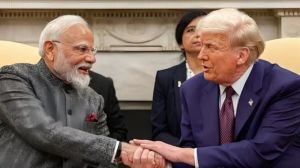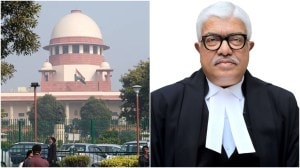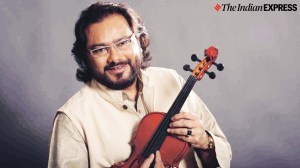`Police must realise they are prosecutors, not persecutors’
Justice Jagdish Sharan Verma was appointed the new chairperson of the National Human Rights Commission (NHRC) on November 1 and was confr...

Justice Jagdish Sharan Verma was appointed the new chairperson of the National Human Rights Commission (NHRC) on November 1 and was confronted almost immediately with the colossal tragedy brought on by the Orissa cyclone. His first public action was to take suo motu cognizance of the calamity.
During his tenure as Chief Justice of India between March ’97 and January ’98, Verma was called upon to deliver several politically and socially significant judgements, some of which had a marked human rights dimension. PAMELA PHILIPOSE interviewed him in Delhi soon after news of the jail riot in Chennai broke. Excerpts:
The human rights issue of the day is of course the riot in the Chennai Central Jail. What does it tell us about the police force in the country?
The police are the first and most important law-enforcing agency. Their duty is not just to apprehend criminals but to prevent crime. If, at the end of a fair trail, a man is found to be guilty, he must be punished and the police isperforming its statutory duty in ensuring this. But it has to discharge this function within the limits of the law. This is as important as ensuring the independence of the judiciary.
In order to ensure that they function as an independent force, certain conditions should be put in place. They need to be well-equipped to do the job. They must be educated not just in terms of mere literacy but in the philosophy undergirding the nature of their work. They must be made to realise that they are prosecutors, not persecutors. The brutality they display comes from the fact that they perform their functions as persecutors.
But even the infrastructure to ensure the basic human rights of prisoners doesn’t seem to exist. Take the state of our jails…
Apart from the police, the judiciary and correctional institutions play a role in the criminal justice system. The judiciary has to ensure speedy justice through a fair trail — a right to a fair trail can be construed as part of the Constitutional right tolife.
Over the years, the basic philosophy of punishment has shifted from the retributive to the reformative. The thing to remember here is that the dignity of an individual is a matter of concern not just for that individual but for society as a whole. In fact, the emphasis on the dignity of the individual is in the Preamble to the Constitution. Therefore, if the dignity of every individual is part of the Constitutional promise, then anything done by any agency anywhere which goes against this principle, goes against the spirit of the Constitution.
The premise is that every individual is a human being and has certain basic, inalienable rights. These rights do not belong to his station in life or his circumstances. Even a murderer condemned to be hanged by the courts does not stand denuded of his human rights until he is hanged. When he is in prison, he is entitled to the basic amenities of life. His larger rights may be restricted for instance, that of free movement — but his basic rights are inherentin his being a human being.
Prison authorities should therefore ensure the basic rights of everyone within their institutions. While people are in prison, every effort must be made to reform and rehabilitate them. If you reform them, society gains. Citizens who were a negative factor become a positive factor. It also helps check the proliferation of crime in society. Today, unfortunately, a small-time offender, after associating with hardcore criminals in prison, become a hardcore criminal himself.
Coming to your recent move to take suo motu cognizance of the Orissa cyclone, does it not speak poorly of politicians that they should be bickering while people are dying?
I don’t wish to talk about the politicians. But as the head of this Commission, I perceive the Orissa tragedy in three phases. The first concerns the period before the onset of the cyclone. What was the information which was had and what was the time available? Was the information received all that could be had? Once thatinformation was obtained, was it transmitted at every level? What action, if any, was taken by the authorities to protect people?
While the cyclone raged, what further measures could have been taken to reduce the extent of damage? After the cyclone, what measures need to be mounted to safeguard human life and provide relief to the people? At present, the first part of the inquiry must wait. We are concentrating on the third part our special representative stationed at Bhubaneswar is to inform us on a regular basis how the system of dispensing relief is working and where is it failing. This will enable us to take further steps and issue appropriate directions to the Central and state governments.
The NHRC has time and again talked of human rights violations in J&K and the Northeast. What is your own view on the matter?
In 1997, a Constitution bench of the Supreme Court, presided over by me, as Chief Justice of India, looked into the question of the validity of the Armed Forces (Special Powers)Act. The then attorney-general, on our request, gave in writing on behalf of the Government of India the safeguards to be read as guidelines for the authorities. These safeguards are for the protection of human rights.
We upheld the validity of the law only on the basis of those safeguards being read into the enacted law. This is how the protection of human rights has been ensured even during the operations by the armed forces in sensitive territories.
As the Supreme Court judge in the `Vishaka versus State of Rajasthan’ case in 1997, you recognised the need to address the systemic violence against women in the workplace. But it has not been translated into law.
The Constitution provides the status of law to the decisions of the Supreme Court. In my order, I had said that this will be the law of the land until it is passed as an Act by Parliament. I now expect women’s organisations to come up and take the process forward. As I said earlier, any affront to the dignity of a woman is more than anaffront to the dignity of an individual it is an affront to the dignity of society.
The NHRC has long argued that the country must accede to the 1984 Convention Against Torture. Yet nothing has happened.
Here again a judgement I made as a Supreme Court judge is relevant. I ruled that when there were gaps in domestic law, and to the extent that domestic law is not inconsistent with international norms or conventions, help can be taken from those international norms and conventions to construct domestic law. In any case, Article 21 protects the right to live with dignity and the use of torture is incompatible with that right.
But how can the writ of the NHRC run when its observations don’t have judicial validity?
This is one Commission where the minimum qualification for the person appointed to head it is that he or she had once occupied one of the highest offices in the country — that of the Chief Justice of India. Besides, it is headed by people who have a known track record. TheCommission exercises a moral authority.
The Commission is enjoined to highlight not just the violation of human rights but the neglect of any agency in preventing the violation of human rights.
The challenge really is to achieve this not merely on paper, but in action. We intend to do our best. I have never been deterred by the magnitude of such tasks.





- 01
- 02
- 03
- 04
- 05


























